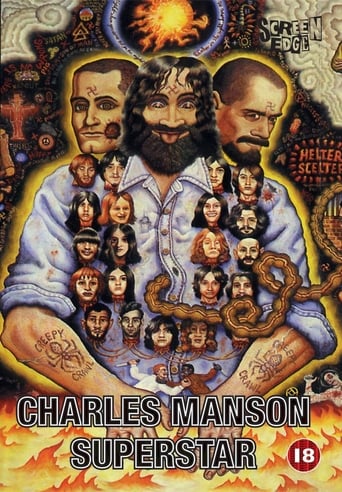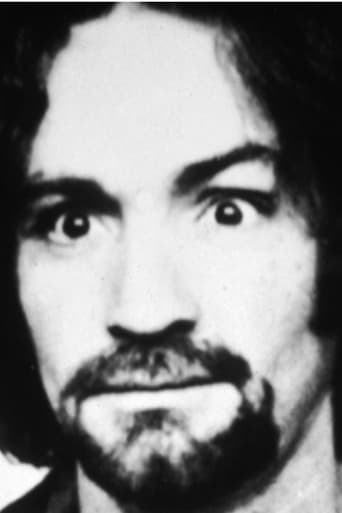Charles Manson Superstar (1989)
For forty years, Charles Manson has survived most of his life in what he calls 'the hallways of the all ways,' the reform schools, jails and prisons that have been his home and tomb. His thought was born in the hole of solitary confinement, apart from time and beyond the grasp of society. In his cell, he created his own world and speaks his own language: he has concluded that there is only the mind. From convincing his followers to move into the desert to train for the apocalypse, to leading a murderous crew through a string of devilish murders, you will see and hear from Manson himself of how he created a preconceived terror based on his philosophy of life. Manson claims that the so-called 'straight' world outside of prison is but an inverted reflection of the underworld in which he has lived. To him, the reality that presidents and law-abiding citizens accept begins in the hermetic alternate universe of criminals, cons and outlaws.
Watch Trailer
Free Trial Channels
Cast


Reviews
Most undeservingly overhyped movie of all time??
It’s fine. It's literally the definition of a fine movie. You’ve seen it before, you know every beat and outcome before the characters even do. Only question is how much escapism you’re looking for.
There are moments that feel comical, some horrific, and some downright inspiring but the tonal shifts hardly matter as the end results come to a film that's perfect for this time.
If you're interested in the topic at hand, you should just watch it and judge yourself because the reviews have gone very biased by people that didn't even watch it and just hate (or love) the creator. I liked it, it was well written, narrated, and directed and it was about a topic that interests me.
Over the last few decades, all but the faintest trace remains of the potently symbolic light in which Charles Manson, his Family, and the murders that brought him notoriety were originally seen. While now sanitised by parody, media-overexposure, and age, it takes some feat to imagine the supernaturally charismatic anti-messiah and serious-threat-to-the-foundations-of-society he was once portrayed as. Yet it is this image which 'Charles Manson Superstar' evokes and explores in a way which begins by mixing erudite objectivity and reasoned (but slightly unnerving-in-its-implications) apologism with the kind of all out glorification writer/director Nikolas Schreck has made no bones about in the past. Indeed, one time associate of the Church of Satan and founder of spin-off, eugenics-endorsing, organisation the Order of the Werewolf, Schreck and partner Zeena (daughter of Anton) LaVey were the driving force behind the 8/8/88 Satanic rally, held on the anniversary of the Tate murders to commemorate the "cleansing" they represented. What's more, during the rally, a movie ('The Other Side of Madness') was shown which depicts the murders in grisly detail and drew cheers from the crowd when the slaying began.Morally dubious this may well all be, but 'Charles Manson Superstar' is nonetheless a highly rewarding documentary. This is due to the fact that the all-out Manson sympathy agenda only emerges on a few occasions and yet somehow the fearlessness needed to admit this perspective (so readily dismissed as misguided or otherwise condemned as degenerate) has a curiously liberating effect on the remaining parts of the documentary which objectively contextualise the man and the crimes as well as broach the difficulty/futility of attempting to penetrate the body of sensationalist media myths and social paranoia that plagues discussion of the topic. Furthermore, the line separating glorification/objectivity is blurred by the extended interview footage with Manson himself which between some silly karate moves, word-salad, and uber-60s style opining on "the music you dig?" permits him space to elaborate on the role of the Gnostic God Abraxas, the ecological movement (ATWA) which he founded, and offer penetrating criticisms of the incestuous relationship between the media and society and the parasitic relationship both have to crime and criminals. All of which really does offer glimpses of an attractive anti-establishment philosophy synthesised by a keen mind which could easily offer solace to society's disaffected and certainly shows Manson as far more intelligent than the one-dimensional malevolent-hippie-lunatic he is uniformly presented as.Having read several reviews over several sites, much seems to have been made of the supposed "numerous" factual inaccuracies which "litter" the film. However, most reviews I have read stop short of actually listing them. As far as I can gather, this is an exaggeration: a few inaccuracies there are, but these include the birthday of Ed Gein and the fact the documentary claims Lennon wrote the song 'Helter Skelter' when we all know it was McCartney. Hardly condemning stuff, and it seems that focusing on these kind of trivialities is designed to detract attention away from the more penetrating and thought provoking aspects of the documentary. However, having said this, there is one inaccuracy of note: the film advocates the apologist argument that Manson's incarceration is due to his anti-establishment ideas and that he was not responsible for the murders nor even present at the scenes of the crime. While there is an argument that Manson's continued incarceration is an unjust political move designed to avoid the uproar that would accompany it, the role of wholly innocent sacrificial lamb really doesn't suit him and it is generally acknowledged that while he never actually slayed anyone, he was present at the scene (albeit in a casing capacity) and it was the acid soaked apocalyptic milieu he crafted that was certainly a fundamental aspect of the atrocities.This point duly noted, in my opinion the wealth of information and the wholly original perspective the documentary offers makes its limitations forgivable and even though the caveats are that Schreck's agenda should be known and it should be watched alongside other documentaries as a point of comparison, 'Charles Manson Superstar' is nonetheless a fascinating watch and has much to offer even the most knowledgeable followers of the pop-culture phenomenon that ended the Sixties.
Aside from the "Pro" Manson bent and factual errors this an excellent & intriguing documentary. The best parts (as I'm sure anyone who has seen this will agree) are the one on one interviews with Charlie himself. Sure he seems pretty nutty, but underneath some of the babble he babbles has a ring of truth to it (his thoughts regarding prison for example). At times the narration gets a little monotonous and boring and some facts are presented wrong. But still over all entertaining and it makes you think. If you're really into this s**t like I am, you should check out the 1973 documentary "Manson". The two together make an excellent double feature.
There are many films explicitly about Manson, and even more loosely inspired by him and the deeds attributed to him & 'The Family.' Most of them are worthless except as pure exploitation. This is the only one that provides more than a snippet of actual interview footage with the man himself. It is primarily for this reason that I strongly recommend it. If you have any curiosity, or interest in Manson, whether you despise or admire this legendary American outlaw, you'll want to see "Charles Manson, Superstar" to augment your perception of him. Be advised that the makers of this film are evidently Neo-Nazis, and their biased approach is about as subtle as a brick dropping on your head. Even if Manson was/is a Nazi, I think such indulgences as the interview with James Mason, American Neo-Nazi, detract from rather than add to the film. On the plus side, George Stimson was a consultant on this film, and he was a confidante to CM, and onetime webmaster of the "official" Manson website. Of all the films about Manson, this one, however amateurish, patronizing and biased, is the most legitimate, if only in the sense that it allows Charles Manson to speak for himself.Other films of note on the subject are "Manson" [1972] and "The Helter Skelter Murders" aka "The Other Side Of Madness" [1970].
The film itself is interesting to see because it's a great example of a documentary that gets across the exact opposite message of what the filmmaker intended (Triumph Of The Will is another). The basic film goes between two types of footage. One is made up of still photos and stock footage (sometimes "enhanced" by lame psychedelic effects) with narration. The narration, read in monotone, sounds about like what you might expect a pseudo-rebel middle school student to post in a Manson chat room - It's Manson's familiar history told with glowing admiration and peppered with phrases like "Manson only reflects the society that imprisoned him" and references to "the conditioned masses" that consider Manson to be the half witted turd that he is. The narration criticizes Manson's victims and his keepers, while praising Manson. The filmmaker, Nikolas Schreck, also managed to score a lengthy prison interview with Manson. The interview delves only slightly into what Manson is infamous for (the pointless, envious, brutal murders of his racist hate cult), and instead centers on Manson's "philosophy". Manson's philosophy, as anyone who has seen him interviewed knows, is basically that everyone is phony and screwed up except him. He really says nothing else in the interview, and whenever he reaches a point in his monologue where he might otherwise say something informative, he instead makes a contorted face and giggles or does some kind of karate dragon dance. He is un-chained and un-handcuffed in the interview and is free to walk around the room. Whenever the filmmaker asks a difficult question (though, not much more difficult then "say something to the camera that you have always wanted to tell people"), Manson masterfully intimidates him off the topic by standing and approaching him or touching him, at one point taking one of his hands and caressing it for several seconds. The entire thing is scored by bootleg recordings of Manson's tortuously bad music.








